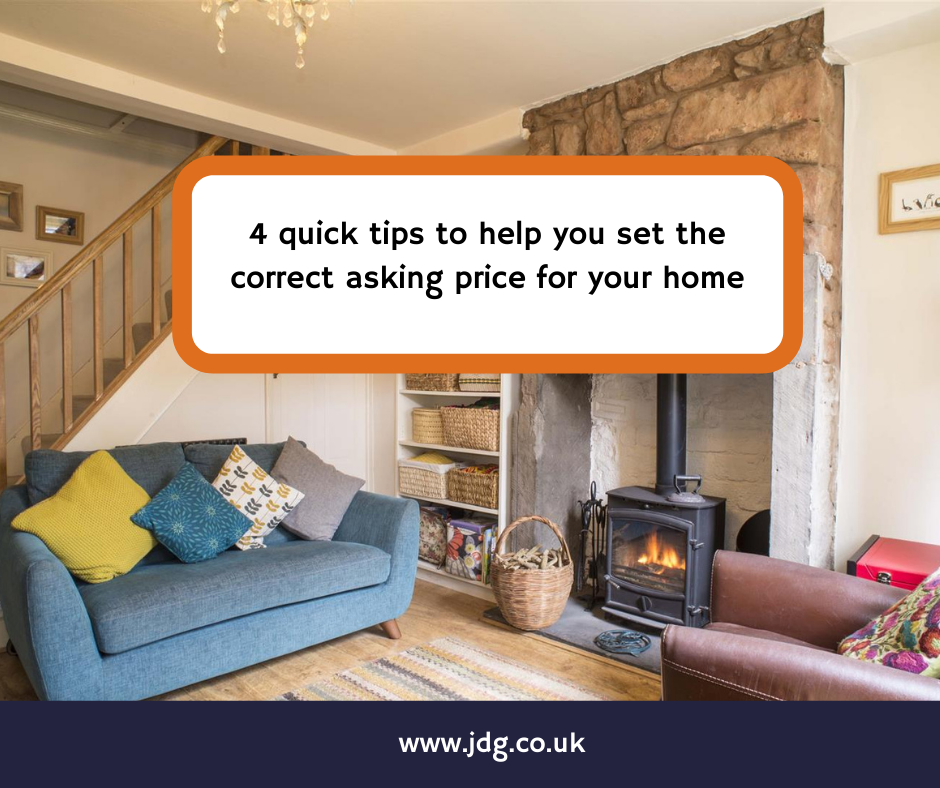
Posted on Friday, December 20, 2024

At JDG it is our job to advise you on how to get the best price for your property. Different factors are taken into account and these can differ depending on the current market conditions. However to make it easier for you to understand we have broken it up into 4 useful handy tips!
They are also available in various guises to the public. Rightmove have a price comparison tool on their website, land registry shows you what your neighbours have recently sold for and Zoopla even gives an “estimate” has to what your home is worth. All of these tools can be used as a rough guide and should give most people an indication within 10% of what their home could be worth.
Supply and demand is a major factor when pricing a property for sale. This varies not just from area to area, but also from street to street. A prime example is a house we have just sold in Freehold, Lancaster. It was smaller in size than a home we had already sold across the street, however, it had a west-facing garden and castle views. We have buyers registered specifically looking for Freehold roads with Lancaster Castle views. Hence this home sold above the asking price as there were two competing offers and for a higher sq m price when compared against the house across the road. It was in demand.
The condition of your home is a major factor. And this is where homeowners need to try to put personal feeling and memories aside. Buyers aren’t really interested in your labour of love, how you spent hours sanding the floor or the time it took to strip all the paint off your bannister! They see what they want to see. They compare your home to other properties of a similar price or style up for sale. To ask a higher price, the condition of your home needs to reflect that. Your older style kitchen might be immaculate and your coloured bathroom suite in superb condition, however, a buyer will still view it has “older. To command more, you need to offer more.
Have you heard of the zero price strategy? Take a look at the property portals like Rightmove and Zoopla. Look at their price banding. Now consider a house worth around £150,000. If you price it at £149,950 you could be on a long list of houses priced at the same. Where on the list will you appear? Price at £150,000 and you’ll be one of the first to be seen!
Also, consider if a buyer is doing a search between £150,000 and £160,000 for example. At £149,950 you would not even show. At £150,000 you would.
Across the country, the prices estate agents achieve for their clients home varies considerably. The market conditions differ greatly, as does the supply and demand for homes. Some agents will take a competitive pricing approach to attract more buyers and thus enter a bidding game. They will talk about regular achieving prices over the asking price. The other will price high and thus end up reducing the price sometimes several times to attract a buyer. They will talk about “trying the market”. Buyers will do their homework. Price your home too high and they simply won’t look. Price it cheap and you will have several keen buyers hunting you out!
My advice is to choose an estate agent you can trust. Listen to their advice. Act upon their suggestions. If in doubt question and ask them on their reasons behind the price. How do they justify it? Your first 30 days on the market are essential. When houses are new to the market they command the most attention. This is why you must set you asking price correctly from the beginning!
If you’d like any advice on the asking price of your home, or indeed if you are currently up for sale and want to know my thoughts, please get in touch. At JDG we love to help. Our advice is free. Call us on 01524 843322 or email me at michelle@jdg.co.uk